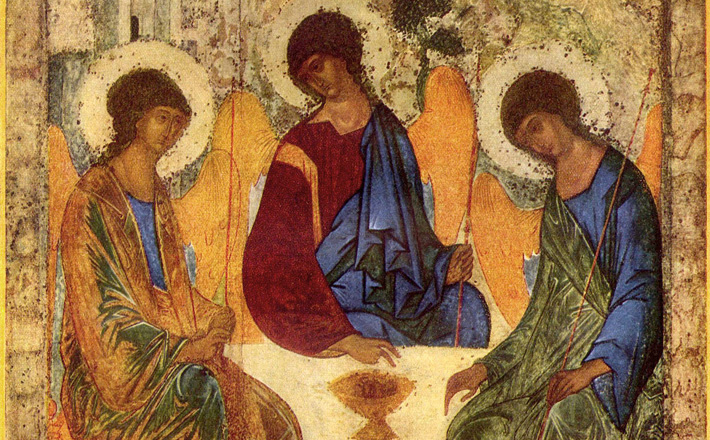Commentary on Psalm 8
While Psalm 8 is addressed to God, it’s really mostly about us: about the human relationship with the rest of creation and about the right exercise of human dominion.
But as the psalm also shows, human sovereignty can only be understood in light of divine sovereignty, in light of what it means to call God “our Lord.”
The opening verse of Psalm 8 is replete with royal language, the meaning of which is illuminated by the body of the text. The very words “Lord” and “sovereign” are, of course, words used for a king (see 1 Kings 1:11, 43, 47). That the majesty of God’s name is praised also points to a royal understanding of God, and the territory over which God reigns is “all the earth.”
So what does it mean to say that God is the Lord, our Sovereign? In verse 2, while the meaning of the phrase “Out of the mouths of babes and infants” is unclear, what is clear is God’s strength in overcoming “the enemy and the avenger,” the forces of chaos that God defeats at the creation. The psalmist then turns to that creation, describing the heavens with the lovely phrase “the work of your fingers” (verse 3).
Marveling at the wonder of the establishment of the moon and the stars, the writer is struck by a particular sense of awe. It is not simply the insignificance of being one human in the midst of the vastness of the universe, a sense that many of us have experienced looking at the stars ourselves, or at mountains or a sunset.
What the psalmist is expressing here is not even the insignificance expressed in biblical passages that at first appear similar. Psalm 144:3-4, for example, begins with a similar question: “O Lord, what are human beings that you regard them, or mortals that you think of them?” In Psalm 144 it is human frailty that makes God’s interest in us incomprehensible: “They are like a breath; their days are like a passing shadow.” What concern could God possibly have with beings that are here one moment, gone the next? Here in Psalm 8, however, what the writer finds so wondrous is that the very God who established the order of the heavens actually cares for human beings, for us, for me (verse 4).
Reflecting the language of being made in the image of God in Genesis 1:26-27, the psalmist proclaims that human beings, mere mortals that we are, are made a little less than divine (verse 5a). We bear God’s image, or God’s face, in the world. Like God our Lord, we are “crowned” with “glory and honor” (verse 5b). In other words, in our relationship to the world, we reflect the character of God as Sovereign.
God has given us “dominion” over God’s created world, and put all things under our feet (verse 6). Royal language like that previously used to describe God is now ascribed to human beings. The range of our dominion, like God’s, is all-encompassing, from the domestic animals that share our labor to wild animals, birds, and sea creatures (verses 7-8). We are made to share in God’s governance of the world, to serve as representatives of God’s own dominion.
By the time we reach verse 9, the repetition of verse 1, we know more fully what it means to call God “Lord” and “Sovereign,” and what it means to share in that sovereignty. The lordship of God is revealed precisely in God’s care for us. God provides for us, desires our good, and enables us to seek it. We reflect God’s image in the proper governance of our fellow creatures.
The world that is at our feet is not there for us to trample. It is there to receive our care, for us to provide for it, as a whole and in each part, and to seek creation’s fulfillment. In the psalmist’s understanding of sovereignty we can hear the echo of the description of the king of God’s choosing in Deuteronomy 17. The king who serves in God’s image keeps the covenant and observes God’s law, not “exalting himself above other members of the community” (verses 18-20). In our dominion over creation, we are to remember the covenant and God’s commands, and not seek our own good at the expense of the domestic and wild world.
The implications of this are, of course, are far-reaching. How to interpret humanity’s proper governance over the rest of creation must go into assessing questions regarding ecology; food production, distribution, and consumption; medical and technological advancements; even the morality of puppy mills. To be human is to be responsible for our fellow creatures, and we must take that responsibility with the utmost seriousness.
Moreover, at the same time that Psalm 8 recognizes our dominion, it also reminds us of our humility. We are each still that awestruck person gazing in wonderment at the stars. We bear the image of God; we are not God. Our finitude and fallibility must be kept in mind as we exercise our responsibility. We are also reminded that we are a part of the creation over which God has granted us dominion. We do not stand apart from our fellow creatures, but we stand with them.
All creatures, including human beings, live in interdependence with one another. As much as we have dominion over creation, we are also dependent upon it for our well-being. Our sovereignty can never mean that we place ourselves over-against the creation. As “lords” over creation, we are in fact servants of it.


June 15, 2014